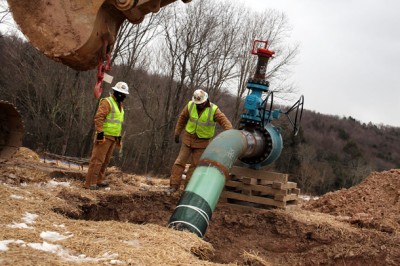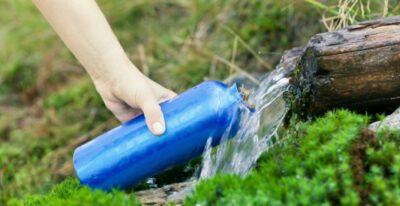Hydraulic fracking has the potential to pollute the nation’s streams, aquifers and wells, according to a massive new report from the Environmental Protection Agency that also concluded that even though pollution already has happened, it is not widespread.
It is the largest review to date of the controversial oil and gas extraction technique. Although the report said fracking has not caused widespread harm, that is of little comfort to well water users who already have seen their source of water ruined.
The process of fracking involves injecting water and chemicals at a high pressure underground to discover oil and gas.
Both sides of the debate found material in the 900-page draft report to support their position. More than 9 million Americans lived within one mile of a fracked well in 2013, and around 6,800 drinking water supplies are located within one mile of such a well. Fracking is now taking place in 25 states.
“We found that hydraulic fracturing processes are being carried out in a way that has not led to widespread, systemic impacts on drinking water,” Thomas Burke, science advisor and deputy assistant administrator of EPA’s Office of Research and Development, told the press. “The number of documented impacts is fairly low compared to the number of wells.”
Ultra-Efficient Water Filter Fits In Your Pocket!
At least one critic of fracking, Amy Mall, a senior policy analyst with the Natural Resource Defense Council, disagreed with Burke’s conclusion.
“This draft study provides solid scientific analysis that fracking has contaminated drinking water around the country,” Mall said. “The report, while limited, shows fracking can and has impacted drinking water sources in many different ways. We agree that the public needs better protections.”
Fracking Industry Didn’t Cooperate?
Significantly, Mall said, the fracking industry apparently did not fully cooperate with the EPA’s investigation into fracking.
For example, the EPA said it lacked complete information on “the number and location of hydraulically fractured wells, the location of drinking water resources, and information on changes in industry practices.” The EPA relied on FracFocus, a voluntary reporting source funded by the industry.
“Well operators claimed at least one chemical as confidential at more than 70% of wells reported to FracFocus and analyzed by the EPA,” the report said. “The identity of these chemicals, and other chemicals in produced water, are needed to understand their properties and would also help inform what chemicals to test for to establish baseline conditions and to test for in the event of a suspected drinking water impact.”
One reason for this concern is that oil and gas drillers regularly inject used fracking liquid down wells that are near aquifers. The EPA report said nationwide, the fracking industry uses at least 453 chemicals which are “long-term contaminants.”
New Survival Seed Bank™ Lets You Plant A Full Acre Crisis Garden!
“Thus a large proportion of most hydraulic fracturing chemicals tend to remain in water,” the report said.
The oil and gas industry refused to allow baseline testing of fracking sites prior to drilling which would have provided a more accurate picture of the effect fracking has on water, Geoffrey Thyne a geologist who served on a scientific advisory board to the study, told The Times. Such a test would have involved testing the water before and after the fracking operation.
“I’m very disappointed to see that we did not have any prospective studies as part of this effort, and I think it undermines the strengths of the conclusions,” Thyne said.
The study did not cover some of the other potential effects of fracking that could cause contamination, said Mark Brownstein, a vice president at the Environmental Defense Fund.
“The process of fracking itself is one risk factor,” Brownstein said. “But … ongoing physical integrity of the wells and handling the millions of gallons of wastewater coming back to the surface after fracking … are even bigger challenges.”
Brownstein is worried that fracking water – full of chemicals – will rise to the surface and enter the water supply. He is also concerned about capped fracking wells leaking in the future.
The study was commissioned by Congress in an attempt to determine fracking’s effect on water. Despite that mandate, the study seems to raise more questions than it answers.
Do you believe fracking can poison the water supply? Share your thoughts in the section below:
Fracking: Is The Nation’s Water Source Truly Reliable? Read More Here.
 Off The Grid News Better Ideas For Off The Grid Living
Off The Grid News Better Ideas For Off The Grid Living





